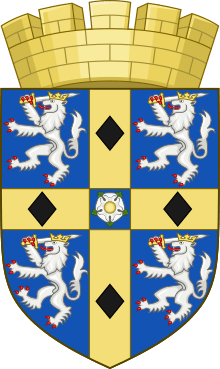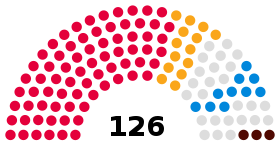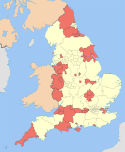Durham County Council
Durham County Council is the local authority of the non-metropolitan County Durham (i.e. excluding the ceremonial county's boroughs of Darlington, Hartlepool and Stockton-on-Tees, which have their own unitary authority councils) in North East England. Since 2009 it has been a unitary authority, having the powers of a non-metropolitan county and district council combined. From 1889 to 2009 it was a county council in a two-tier arrangement.
Durham County Council | |
|---|---|
 Arms of Durham County Council | |
| Type | |
| Type | |
| Leadership | |
Chairman of the Council | |
Leader of the Council | |
Chief Executive | Terry Collins |
| Structure | |
| Seats | 126 councillors[1] |
 | |
Political groups | Executive (74)
Opposition (52)
|
Length of term | 4 years |
| Elections | |
| First past the post | |
Last election | 4 May 2017 |
Next election | 6 May 2021 |
| Meeting place | |
.jpg) | |
| County Hall, Durham | |
| Website | |
| http://www.durham.gov.uk | |
At the time of the 2011 census it served a population of 513,200, which makes it one of the most-populous local authorities in England. It has its headquarters at County Hall in Durham.
History
Durham County Council was initially established in 1889 as the upper-tier local authority for the administrative county of Durham. The county council was reconstituted in 1974 as a non-metropolitan county council. Darlington was removed from the area of responsibility in 1997. Durham County Council became a unitary authority on 1 April 2009 when the seven remaining districts of the county (Durham (City), Easington, Sedgefield (Borough), Teesdale, Wear Valley, Derwentside, and Chester-le-Street) were abolished and the county council absorbed their non-metropolitan district functions.
Following the structural changes in 2009, legislation[2] allows for the council to name itself "The Durham Council", however the council has retained the name of Durham County Council. The current leader of the council, Simon Henig, is since 15 April 2014 also chair of the North East Combined Authority.[3]
References
- Durham County Council, webadmin@durham gov uk. "Local MPs and MEPs - information and advice". Durham County Council. Retrieved 10 February 2019.
- "The Local Government (Structural Changes) (Miscellaneous Amendments and Other Provision) Order 2009". Legislation.gov.uk. The National Archives. Retrieved 10 February 2019.
- Fearn, Hannah (25 March 2015). "The 'super-council' leader making friends across the north-east". The Guardian. Retrieved 25 March 2015.
| Awards and achievements | ||
|---|---|---|
| Preceded by Greenwich |
LGC Council of the Year 2014 |
Succeeded by Glasgow |
